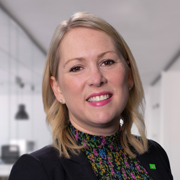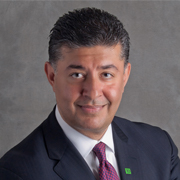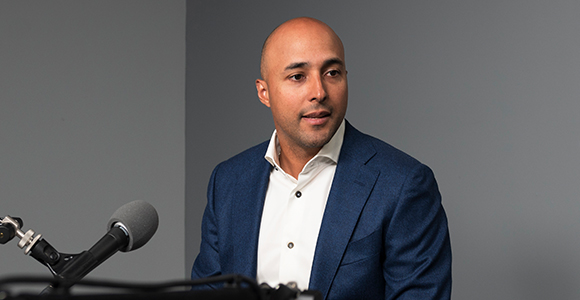The Convergence of Digitalization in Financial Institutions

Host: Amy Van Arnhem, Managing Director and Head of Canada Senior Relationship Management, TD Securities
Guests: Akhil Lamba, Executive Managing Director and Head of Global Transaction Banking, TD Securities and Dan Bosman, Senior Vice President and Chief Information Officer, TD Securities and Treasury & Balance Sheet Management (TBSM).
Listen as our leaders in global transaction banking and technology, Akhil Lamba and Dan Bosman discuss how developments in the metaverse, artificial intelligence (AI), digital currency, and Web 3.0 are moving towards an open universe of customizing and adapting to client-focused solutions.
Listen to additional episodes for more perspectives from a variety of thought leaders on key themes influencing markets, industries and the global economy today.
AMY VAN ARNHEM: Welcome to Viewpoint, a TD Securities podcast. Listen in as we draw perspectives from a variety of thought leaders on key themes influencing markets, industries, and the global economy today. We hope you enjoy this episode.
Hello. And welcome to episode 13 of Viewpoint, a TD Securities podcast. I'm your host Amy Van Arnhem, Senior Relationship Manager at TD Securities. I am joined today by Akhil Lamba, Executive Managing Director and Head of Global Transaction Banking, and Dan Bosman, Chief Information Officer and Head of Technology Solutions. Today, we are going to speak about the rapid digitalization of the financial services industry. So thank you both very much for joining me today.
AKHIL LAMBA: Thanks, Amy.
DAN BOSMAN: Excited to be here.
AMY VAN ARNHEM: So I have a bit of a confession to make before we sort of jump into the questions. When I started my career in finance-- I want to say 20 years ago-- I never thought that technology would be a key component of what I did on a day-to-day basis. I thought I'd have to learn Excel, financial modeling, and I would be good.
Well, flash-forward 20 years, and I think we can safely say that technology is now a hugely integrated part of the business, which is why I think it's so amazing that we have somebody here to talk today about this from the business, Akhil with 20 years experience in global transaction banking and Dan, 20 years experience on the technology side. So two great experts to delve a bit more into the topic of digitalization.
So to start off with, Akhil, maybe you could speak to Sibos. It's a conference that's taking place this year on October 10 to 13 in Amsterdam. It's going to bring together hundreds of global financial institutions under one roof, including TD Securities. So could you give a quick overview of what takes place at Sibos and why it's considered a flagship event for so many financial institutions?
AKHIL LAMBA: Sure, so Sibos is really hosted by SWIFT which is the Society for World Interbank Financial Telecommunications, the way banks speak to one another and communicate with each other on a secure basis. Sibos started off as a technology conference and over many, many years has morphed into a technology conference and a relationship conference. So you have typically between 7,000 to 10,000 people attending the conference. And it is the whole relationship side of the business, the technology side of the business, and all the new product development side of the business. So you have banks, and you have fintechs, and you have large tech companies who are all under one roof over a period of four or five days trying to transact and understand what's new in banking.
AMY VAN ARNHEM: Wow. That's exciting. So, Dan, the theme of this year's conference is progressive finance for a changing world-- a focus on how financial service providers can identify, adapt, and scale forward-thinking innovations and manage risk in an uncertain world. So for an industry that can be a bit notoriously traditional, what forward-thinking innovations are you currently seeing emerge from the financial services industry?
DAN BOSMAN: Well, at first, I'd say, challenge that description of being "notoriously traditional." I think
historically the banking industry, the financial services industry, we've had a lot of innovation and we've been at the forefront. And I think participation events like Sibos are kind of a key part of that. One thing that we do know is there's a lot that we can learn from the fintech community as a whole, certainly seeing innovations in open banking. There's some changes that are driven from the regulatory side that are driving much-needed innovation in certain parts of our business.
But we're seeing things like cloud and data, while not new to some of the big tech out there, I think they really now begin to come into their own into our industry, seeing a lot of movement in terms of things like data meshes, data fabric, which is really kind of the foundation. And then on top of that, how do we distribute and touch our clients and share that data? So that might be through APIs, through microservices, and other areas. But the cloud, certainly, is a huge enabler for us. I know at TD, it's a huge part of our strategy. But really, we're always looking at the fintech community and looking at where we can partner, where we can help support, and where we can help bring that technology into the bank to help meet our client outcomes.
AMY VAN ARNHEM: OK, great. And we are going to definitely get a little bit more in detail to some of the things that you brought up in that answer a bit later on. And, Akhil, specifically, maybe we could turn to you and talk a little bit more about open banking. So my understanding is this is allowing consumers essentially to share financial data with fintech companies securely.
And recently, we've seen that the adoption of open banking in the UK and Australia. So what do you think about the treasury space? And where do you see open banking potentially playing a role?
AKHIL LAMBA: When you talk about open banking, you've got to take a view and segment it according to the market you're dealing with. Open banking is relatively new in the retail space. It's relatively new in wealth. But open banking in the wholesale market space has been around for a long time. And what I really mean by that is we've been sharing data with our clients and clients have been able to initiate transactions with us and with multiple financial institutions for a number of years already.
And they really do this through pretty sophisticated what we call treasury management solutions. What's really changing is how we communicate with clients. And where we are is, Dan sort of alluded to APIs, which is really Application Programming Interface. That is sort of the next phase of open banking in the wholesale space with corporate treasuries-- particularly with corporate treasuries, but also with financial institutions.
The issue with APIs today is that there is no standardized format. And so adoption has been somewhat slow, but I think this is going to self-regulate and self-correct in the very near term. We're already starting to see this happen. There's going to be quicker adoption of APIs. But APIs is going to be the primary mode, which would allow banks like ourselves, and other financial institutions, to interact with clients. And clients can pick and choose whatever services that they want to do with multiple providers at the same time. So it is going to be a complete open universe as far as treasury management and the wholesale market is concerned.
AMY VAN ARNHEM: OK, so I just want to understand that a little bit better. So just to dive a little bit more into what you mean when you say that, so is it essentially a suite of products that a client will have access to across all of its different providers and they'll be able to sort of pick and choose who they link in with?
AKHIL LAMBA: Absolutely. But what APIs is is effectively the connectivity between the bank and the clients. So really today, the dominant way we interact with the large corporate treasury is what we call host to host, which is really a data interchange from mainframe to mainframe. And with APIs, what's going to effectively happen is they can pick a piece of data from one institution, another piece of data from another institution, or a service from one institution.
It's got a lot more flexibility. To put it very simplistically, it's somewhat of a plug-and-play type application. And it allows a client to actually choose the best services, the best products that are available to them from a multitude of providers at a very cost effective way.
AMY VAN ARNHEM: Wow. That sounds like it would change the competitive environment quite a bit. So, Dan, just changing topics a little bit, we've recently seen many industry and business implement artificial intelligence in their day-to-day business practices, proving that, I guess, AI is no longer in the exploratory phase. And it's a big theme at this year's Sibos. What ways are we seeing financial institutions leveraging AI for client solutions? And where do you think the future of AI in banking lies?
DAN BOSMAN: That's a great question. So I think financial institutions are really just scratching the surface when it comes to using AI and ML. But we know there are a lot of business processes that could benefit here and it could be from improve quoting and trading, various other revenue generating opportunities, all the way through operational efficiencies, things like in fraud or ML. And that's really where we've seen some really great use cases today, actually, is on the retail side, if you think about fraud detection, huge data sets, looking for suspicious activity, trying to bubble that up.
It's very early days. I think it's an area that most banks are heavily invested in. Certainly at TD, we made an acquisition several years back for a company called Layer 6 that's been leading. We've actually had some great wins in our global markets division, where we're actually looking to use our own ML for pricing. Again, very early days, tying it back to the data theme that I think has been here in this discussion, everything in AI and ML, it involves having clean data sets to train on, to understand. And so I take it back to some of the discussions on data, on APIs, on making data accessible, that's a huge foundational item that when done well, unlocks the value of AI and ML and some of these other innovations.
AMY VAN ARNHEM: And AML is the Anti Money Laundering.
DAN BOSMAN: Anti money laundering. Yeah.
AMY VAN ARNHEM: Yeah. No, I think that AI definitely, from being able to service our clients is hugely important, especially from my perspective. And as clients' activity is driven more online, being able to provide that seamless service model, not just from an in-person--
DAN BOSMAN: Well, you're seeing that you're in your personal life, I'm sure, right, where you start to see the most simple example is on your phone. How the companies serve up ads to you. They're tailored to you, right? This is because we've got all of that data and we understand your behaviors and what you want to see. Now, I'm not saying that directly translates into our industry. But we know that there are huger opportunities for us to take this technology and to deploy it in our client-facing businesses. And we are.
AMY VAN ARNHEM: So, Dan, another question for you, and I think that we've all seen a lot of buzz around the metaverse lately. And in fact, I should share that as I was on my way down here, it was also a headline on the television as I came down talking about the opportunity to buy or to sell products in the metaverse. So many large companies right now, we're seeing them claiming stake to their virtual plot of land. Do you think there's a place in the metaverse for capital markets firms? And in your opinion, should they start purchasing real estate?
[LAUGHTER]
DAN BOSMAN: Well, listen, I think the success of the metaverse is defined by VR goggles and an immersive 3D world, like in a video game, I think still in question. But what is kind of real behind there, some of the technologies and foundations that are powering the metaverse. You'll hear that talked about as Web 3.0 is a big part of that. And I think one of the trends that we see are things that could be useful for us around things like federate and decentralize identity management in the metaverse. So how do you know who someone is in the metaverse?
Those are pieces of technology that have a direct implication into our business and what we do. So while I think it's probably a little early for us to go speculating and buying land in the metaverse, I do think there's a lot of technology around Web 3.0 around decentralized finance that could help us grow and better serve our clients. And so I wouldn't rule it out.
One observation I had was just starting to think about where that experience could go, in the pandemic, we saw folks buying houses on Zillow sight unseen, from a 3D tour. It's not a massive leap to go to say, hey, you've got a digital twin of a town or of a house, you can go all the way through that life cycle of viewing, applying for your mortgage, to your bank, and actually closing on a house, like in a digital twin, as an example. I think there is a lot of applicability there.
On the trade floor, do I see anyone walking around in 3D glasses right now? Not just yet. But I certainly am going to be keeping an eye on the space.
AMY VAN ARNHEM: Well, talking about decentralization, another hot topic, Akhil, is around a digital currency. So definitely seeing it reach a fever pitch. And many financial institutions are taking notice. How do you see the new era of digital currencies potentially shaping the future of the payment space?
AKHIL LAMBA: I wonder why I get all these--
AMY VAN ARNHEM: [LAUGHS]
AKHIL LAMBA: --hard questions. Look, I think we've got to break this conversation into two. So you've got crypto-- Bitcoin is probably the largest in that space. I don't see that as being very disruptive in the payment space any time in the near term or in the medium term. I don't see a lot of adoption of that currency. Even within the corporate treasury space, I don't see-- I'm aware of some corporates that have invested in crypto as a storage of wealth. But I don't really see that as being sort of widespread across different corporate treasurers talking about whether they want to keep crypto as a reserve currency as part of the treasury.
I'll flip it around. What I do see is the wholesale Central Bank Digital Currency-- the CBDC, as we call it-- and it's underlying technology which is, again, the Distributed Ledger Technology, the DLTs. And what this is doing is really pushing the boundaries of legacy systems. And what it really does is it makes everything available 24/7, 365. It's more predictable. There's pre-validation that's happening. And it reduces settlement risk through smart contracts.
Some benefits that are evident on it-- essentially speaking, we could probably achieve a lot of these benefits through our legacy systems that we already have by changing our operational hours [INAUDIBLE] to put it very simplistically, our rules on settlement, on pre-validation through SWIFT. We talked about SWIFT as being the dominant basis on which banks communicate with one another in a safe environment and the exchange of funds.
I don't know whether this will happen, whether this is going to go in that direction. There are other things that are emerging that are beneficial coming out of this whole discussion between central banks, is what's called the RLN, the Regulated Liabilities Network, which is really a public-private partnership. This is where banks and central banks would work together to facilitate payments through a digital format in a currency. And we will start seeing some of the benefits.
What I do see the benefit coming out of all this at the end is these emerging technologies are going to push us towards a safer environment. It is going to push us towards being accessible and available 365, seven days a week, 24 hours. Settlements are going to happen in real time. That's for sure.
So there are going to be some very material benefits that are going to come out in terms of liquidity, in terms of risk management coming out of this. Whether the central banks adopt the technology or they don't, it doesn't really matter. At the end, I think you are going to see these benefits.
AMY VAN ARNHEM: And will we get paid by the hour, by the minute, by the second?
[LAUGHTER]
AKHIL LAMBA: Good question.
AMY VAN ARNHEM: I may be putting you on the spot a little bit by asking you this, but do you think that the Bank of Canada will move towards a digital currency in the next decade?
AKHIL LAMBA: I think so. I think it makes sense. In some respects, what's called the RTGS, the Real Time Gross Settlement system, that's how all banks settle amongst themselves in Canada. It really is a digital currency at the end of the day. That's how we settle.
Will the Bank of Canada have it? I do envision at some point, we will have accounts in completely digitized format. I'm not even sure whether there will be prolific use of paper currency in some economies. Particularly in the Nordic countries, you already see that, where paper currency or fiat currencies in paper format or physical format are seeing a drastic reduction in use.
We all want to see some form of digital currency, I think, yet remains to be seen how widespread it's going to be and how inclusive it's going to be to the whole community at large. In certain markets, believe it or not, in the G7, there are a lot of people who are unbanked even today. So any type of digitization has to accommodate for those type of changes too.
AMY VAN ARNHEM: Well, look, this has been great. I appreciate both of you coming in and speaking to us today. I mean we scratched the surface here in terms of these topics. But I thank you. And look forward to hearing the takeaways from the conference.
AKHIL LAMBA: Thank you.
DAN BOSMAN: Thank you.
AMY VAN ARNHEM: Thank you for listening to Viewpoint, a TD Securities podcast. If you enjoyed this episode, subscribe to this series on Apple Podcasts or on your favorite podcast platform. For more thought leadership content, visit TDSecurities.com and follow us on LinkedIn for all the latest TD Securities updates. For relevant disclaimers to this podcast, please refer to the Viewpoint episode page on our website.
This podcast should not be copied, distributed, published or reproduced, in whole or in part. The information contained in this recording was obtained from publicly available sources, has not been independently verified by TD Securities, may not be current, and TD Securities has no obligation to provide any updates or changes. All price references and market forecasts are as of the date of recording. The views and opinions expressed in this podcast are not necessarily those of TD Securities and may differ from the views and opinions of other departments or divisions of TD Securities and its affiliates. TD Securities is not providing any financial, economic, legal, accounting, or tax advice or recommendations in this podcast. The information contained in this podcast does not constitute investment advice or an offer to buy or sell securities or any other product and should not be relied upon to evaluate any potential transaction. Neither TD Securities nor any of its affiliates makes any representation or warranty, express or implied, as to the accuracy or completeness of the statements or any information contained in this podcast and any liability therefore (including in respect of direct, indirect or consequential loss or damage) is expressly disclaimed.

Amy Van Arnhem
Managing Director and Head of Canada Senior Relationship Management, TD Securities

Amy Van Arnhem
Managing Director and Head of Canada Senior Relationship Management, TD Securities

Amy Van Arnhem
Managing Director and Head of Canada Senior Relationship Management, TD Securities
Amy is responsible for providing holistic cross product global coverage to senior executives for Canadian institutional clients. In her role she manages stakeholder relationships by promoting a collaborative and integrated approach across the firm. Joining our firm in 2001, Amy began her career at TD in the retail sector. In 2007, she joined the Sales and Trading rotational program at TD Securities where she gained exposure in Asset Securitization, Proprietary Equity, and Institutional Equities. In 2008, she joined the Institutional Equity Sales desk team where she covered Canadian equity clients.

Akhil Lamba
Executive Managing Director and Head of Global Transaction Banking, TD Securities

Akhil Lamba
Executive Managing Director and Head of Global Transaction Banking, TD Securities

Akhil Lamba
Executive Managing Director and Head of Global Transaction Banking, TD Securities
Akhil is the Executive Managing Director and Head of Global Transaction Banking, leading the Corporate Cash Management, Financial Institutions, Global Trade Finance, and Export & Agency Finance businesses. Akhil connects clients to opportunities, extensive networks, and innovative solutions. He supports client global transaction banking needs using TD Securities’ strong, relationship-driven approach, backed by the strength and reliability of one of the world’s safest banks.

Dan Bosman
Senior Vice President and Chief Information Officer, TD Securities and Treasury & Balance Sheet Management (TBSM)

Dan Bosman
Senior Vice President and Chief Information Officer, TD Securities and Treasury & Balance Sheet Management (TBSM)

Dan Bosman
Senior Vice President and Chief Information Officer, TD Securities and Treasury & Balance Sheet Management (TBSM)
Dan Bosman is the Senior Vice President and Chief Information Officer for TD Securities and Treasury & Balance Sheet Management (TBSM), accountable for all global technology streams and delivering innovative and proactive technology solutions that support the broker-dealer’s business objectives and growth strategies. He has been instrumental in driving project delivery change with a shift to product ownership and agile practices. Through a focus on shared infrastructure, product delivery, developer experience and partnership with colleagues across TD Securities, his team has delivered an award-winning technology platform, and in 2017 he was recognized by IDG Computerworld as a Premier 100 Technology Leader.




